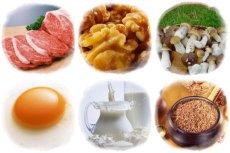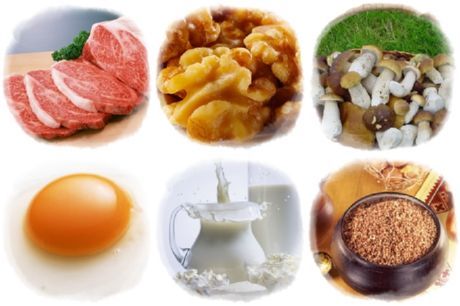Medical expert of the article
New publications
Preparations
Vitamin PP (nicotinic acid)
Last reviewed: 23.04.2024

All iLive content is medically reviewed or fact checked to ensure as much factual accuracy as possible.
We have strict sourcing guidelines and only link to reputable media sites, academic research institutions and, whenever possible, medically peer reviewed studies. Note that the numbers in parentheses ([1], [2], etc.) are clickable links to these studies.
If you feel that any of our content is inaccurate, out-of-date, or otherwise questionable, please select it and press Ctrl + Enter.

Vitamin PP (nicotinic acid) - one of the most necessary vitamins for a person. This vitamin is especially useful for smoking people who have impaired nervous system functions. If the human body does not have enough vitamin PP, it can be aggressive, irritable, it rushes in all directions and can not make decisions calmly. Probably, therefore, doctors dubbed nicotinic acid a vitamin of tranquility. When smokers for a short time stop replenishing their body with nicotinic acid coming from cigarettes, they become very irritable. This is the need for a cigarette.

The use of nicotinic acid (vitamin PP)
All vitamins help the body convert carbohydrates from foods to energy sources (glucose), and nicotinic acid is no exception. It is part of a complex of vitamins necessary for healthy skin, hair, eyes and good liver function. Vitamin PP also helps the nervous system stay strong and workable.
Nicotinic acid also helps the body - attention! - reduce the effect of stress. It inhibits the production of hormones that are produced by the adrenal glands during stress, and also helps improve blood circulation.
Scientific studies have shown that niacin can improve the symptoms of arthritis, including increased joint mobility and reduce the adverse effects of non-steroidal anti-inflammatory drugs.
Studies conducted over the past few years show that people who have been recommended by a doctor for a higher level of nicotinic acid have lowered the risk of Alzheimer's disease.
Another study showed that people receiving sufficient doses of niacin from foods and pharmacy supplements reduced the risk of developing cataracts.
Now scientific studies are being conducted proving that the use of nicotinic acid can reduce the risk of such serious diseases as migraine, dizziness, depression, alcohol dependence and smoking.
The need for vitamin PP
The daily dose of vitamin PP is low - for men it is from 28 mg, and for women - up to 20 mg.
| Age | Daily dose |
|---|---|
| 6 months | 2 mg |
| 7 months - 1 year | 4 mg |
| 1 - 3 years | 6 mg |
| 4 - 8 years | 8 mg |
| 9 - 13 years | 12 mg |
| Boys 14 to 18 years old | 16 mg |
| Girls 14 - 18 years old | 14 mg |
| Age | Daily dose |
|---|---|
| Men 19 years and over | 16 mg |
| Women 19 years and over | 14 mg |
| Pregnant women | 18 mg |
| Nursing mothers | 17 mg |
Forms of vitamin PP
A person who takes nicotinic acid should know that it exists in two forms: niacin and niacinomide. If niacin is used in conjunction with vitamin C, a person will be much easier to tolerate a cold. This is a good remedy for improving immunity. Niacin is good because it can not be destroyed during cooking or drying, so a person can eat processed foods, sources of niacin.
 [1]
[1]
Contraindications
People with liver, kidney, stomach ulcers should not take niacin supplements. Those who have diabetes or gallbladder disease, can do this only under the close supervision of a doctor.
Stop taking niacin at least two weeks before the scheduled operation.
Niacin and niacinamide can aggravate the course of the allergy due to the increase in the substance of histamine in the body.
People with low blood pressure should not take niacin or niacinamide, because it causes a drop in blood pressure.
Do not take vitamin PP in patients with gout.
People with coronary heart disease or unstable angina should not take niacin without the care of a doctor, since in high doses it can increase the risk of heart rhythms.
Taking a vitamin PP for a long time can lead to an imbalance of other vitamins in the body.
 [2]
[2]
Overdose of vitamin PP
Very high doses of vitamin PP can be toxic to the body. Do not take nicotinic acid more than the recommended daily allowance. This can cause fainting, a rash on the skin, itching, weakness, increased doses of "bad" cholesterol in the blood.
Large doses of niacin cause headache, dizziness, blurred vision. There is also an increased risk of liver damage. In addition, nicotinic acid can interact with other drugs or vitamins, causing a person to have an increased risk of heart and vascular disease.
Possible interactions of vitamin PP with other drugs
If you are taking any of these drugs, you can not take niacin without consulting your doctor.
Antibiotics of the tetracycline series - niacin can not be taken together with tetracycline, because it interferes with the absorption and effectiveness of this drug.
Aspirin - its use before taking niacin can reduce the effectiveness of both, so both drugs should be taken only under the supervision of a doctor.
Anticoagulants (drugs for blood thinning) - Niacin can make the effects of these medicines stronger, increasing the risk of bleeding.
Alpha-blockers (drugs to lower blood pressure) - nicotinic acid in conjunction with them can lower blood pressure even more.
Drugs for lowering cholesterol - nicotinic acid binds the components of drugs to lower cholesterol and can make them less effective. For this reason, niacin and similar drugs should be taken at different times of the day.
Drugs for the treatment of diabetes mellitus - niacin can increase blood sugar levels. People taking insulin, metformin, glibenclamide, glipizide, or other drugs to reduce high blood glucose levels should avoid niacin supplements.
Isoniazid (INH) - this drug for the treatment of tuberculosis can cause vitamin PP deficiency.
So, before you include in your diet vitamin PP, you should always consult a doctor to bring your health benefits, not harm.
Food sources of vitamin PP
The best food sources of vitamin PP are beets, brewer's yeast, beef liver, beef kidneys, salmon, swordfish, tuna, sunflower seeds, peanuts. Bakery products and cereals are rich in niacin. Protein products containing niacin are red meat, eggs and dairy products.
Elevated doses of nicotinic acid are used to treat specific diseases only on prescription. The amount of niacin should be increased slowly, for 4 to 6 weeks, and this drug should be taken at meals to avoid stomach irritation.
 [3]
[3]
Lack of vitamin PP
It is a water-soluble vitamin, the body does not store it for long. Therefore, in humans, a lack of vitamin PP, i.e., nicotinic acid, can easily occur.
But you should know that alcoholism is the main cause of vitamin PP deficiency.
Symptoms of a slight deficit of this vitamin are indigestion, fatigue, stomach ulcer, vomiting and depression.
Severe deficiency of nicotinic acid can lead to a condition known as pellagra (one of the types of avitaminosis). Pelagra is characterized by cracks in the skin, scaly skin, dementia (dementia), and diarrhea. Vitamin PP deficiency also causes a burning sensation in the mouth and a swollen, bright red tongue.
Attention!
To simplify the perception of information, this instruction for use of the drug "Vitamin PP (nicotinic acid)" translated and presented in a special form on the basis of the official instructions for medical use of the drug. Before use read the annotation that came directly to medicines.
Description provided for informational purposes and is not a guide to self-healing. The need for this drug, the purpose of the treatment regimen, methods and dose of the drug is determined solely by the attending physician. Self-medication is dangerous for your health.

